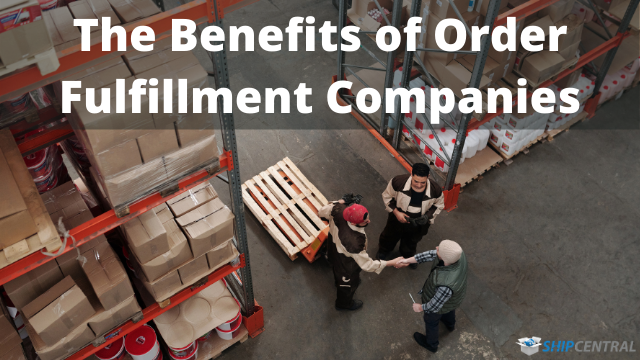
Outsourcing your order fulfillment can free up time, energy and resources so you can focus on growing your business.
Order fulfillment, which includes selecting, packaging, and shipping items, is an essential but sometimes time-consuming component of online businesses. Even though a lot of small firms begin by fulfilling orders internally, when order quantities rise over time, they could find the process burdensome or resource-intensive.
Order fulfillment services provided by third parties may save you a lot of hassles and enable you to handle and deliver client orders effectively. We’ll go over the advantages of outsourcing your order fulfillment requirements, describe the kinds of businesses that work well with this model, and address some common queries you may have regarding order fulfillment services.
What are order fulfillment services?
Order fulfillment services are organizations that let businesses hire outside help to handle their ordering process fulfillment needs. These services include order fulfillment and inventory storage. Online merchants, e-commerce companies, and physical shops without warehouses or delivery hubs are among the usual clientele.
The following services are offered by order fulfillment centers to users:
Receiving: A client’s inventory is received, unpacked, and stored by an order fulfillment provider.
Inventory management: With the use of sophisticated inventory software, order fulfillment services manage inventories. They keep track of the quantity of items in stock, noting both surplus and replenishable inventory.
Order management: Order processing, shipping, and product returns are all taken care of by order management services, which also monitor the whole ordering process.
Product listings: Businesses can post search-optimized product listings on their websites with the help of certain order fulfillment providers.
Advanced reporting: Companies may follow the whole logistical process with the aid of thorough information provided by some order fulfillment providers.
Types of businesses best suited for order fulfillment services
These types of businesses benefit significantly from order fulfillment services:
E-commerce retailers
Customers who shop online choose the things they desire and the preferred shipping option. This strategy generates a steady flow of distinct, different orders that need to be fulfilled and sent. Order fulfillment and shipment might be difficult as sales fluctuate with the seasons.
An order fulfillment service can remove these burdens from e-commerce businesses while providing a digital tracking system that acts as a central inventory database. The order fulfillment service can also handle the hassle of returns and exchanges.
Tip
Items in shopping carts are frequently abandoned by online customers. Use email marketing to deliver discounts or other incentives to customers to finish their purchases in an effort to lower cart abandonment.
Subscription box businesses
There are many kinds of subscription box services — including groceries, health and beauty items, and clothing — but order fulfillment is an essential element of all of them. Fulfilling orders can become a challenge because there are so many subscribers in various locations.
With subscription box fulfillment and shipping, you’ll need to regularly deliver a group of products to customers with a fulfillment process customized to various shipment deadlines. An order fulfillment service can handle this complex process using delivery waves based on how far away subscribers live from the storage facility.
Sellers of heavy or specialized items
All businesses generally have the same order fulfillment steps: receiving inventory, organizing it, picking out a product for an order, packaging it and shipping it. This process is affected when items are particularly heavy, specialized or easily breakable. An order fulfillment service can safely store cumbersome items while developing an effective method of packing and shipping bulky or heavy packages.
Order fulfillment service FAQs
Learn more about order fulfillment services with answers to these frequently asked questions.
How much do order fulfillment services cost?
Although precise order fulfillment costs vary depending on the provider and its pricing models, “pick and pack” fees typically range from 25 cents to $1 per pick. Other associated costs may include the following:
- Warehouse receiving labor
- Inventory management
- Packaging
- Automated shipping
- Returns management
What are examples of order fulfillment companies?
Numerous organizations exist that fulfill orders, each with special products and services that fit different kinds of businesses. Here are a few instances of well-known order fulfillment businesses:
- FedEx Fulfillment: FedEx Fulfillment offers nationwide and worldwide order-fulfillment services.
- Fulfillment.com: Fulfillment.com is an international shipping provider with locations in the U.S., Canada, the U.K., Europe and Australia.
- Fulfillment by Amazon (FBA): FBA serves Amazon marketplace sellers.
- ShipBob: ShipBob was designed by e-commerce entrepreneurs for e-commerce merchants of all sizes.
How do you choose an order fulfillment service?
Take these steps to select the right order fulfillment service for your e-commerce business:
- Assess your company’s needs. Consider your inventory, your order scale, your location, your customers’ geographic locations, the types of products you sell, and seasonality trends.
- Research providers that can meet those needs. Look for order fulfillment services with proven experience in your sector and warehouses in locations that align with your customer base. Read online reviews, or ask for firsthand accounts of the customer experience.
- Evaluate each provider’s offerings and cost structure. The best order fulfillment services have up-to-date technology — some of which may integrate with your existing e-commerce platforms — and a transparent, scalable cost structure.
What is 3PL?
The practice of contracting out e-commerce logistics to a third-party supplier is known as third-party logistics (3PL). While specific procedures may differ throughout businesses, 3PL services generally function as follows:
- Your business sends inventory to the 3PL, either from your storage facility or the product manufacturer.
- Customer orders go to the 3PL manually or automatically via software.
- The 3PL picks the items the customer ordered and packs them for shipment.
- The 3PL sends each package via a shipping service provider.
The whole supply chain is managed by another operational model called fourth-party logistics (4PL). As a single point of contact for the client, a 4PL supplier frequently collaborates with several 3PL providers.

